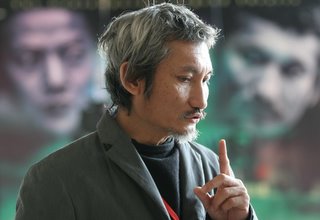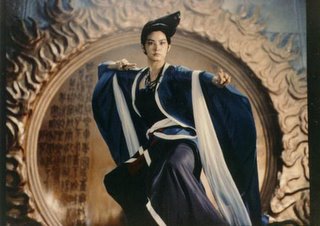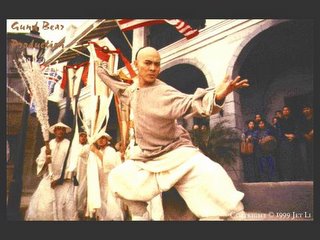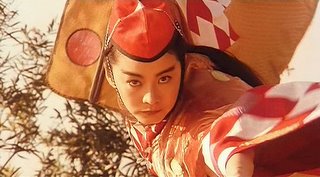



The Original Kungfu Master
--- Tsui Hark discusses the crafts of filmmaking
By Andrew Huang
Contributing Writer
Before there was “hero,” there were “swordsmen.” Before there was “crouching tiger,” there was “iron monkey.” After dabbling with contemporary realism drama such as “Time and Tide” and comedy such as “Master Q,” Hong Kong master Tsui Hark is coming back this year with a genre in which no one does it better – his latest kungfu epic “Seven Swords” to be released in July.
With Tsui as director and artistic director, “Seven Swords” also rounds up the world’s premier action director Yuen Ho Ping and China director Zhang Jinyen (who turned Jet Li into a star in China in the 80’s) of “Shaolin Temple” fame as consultant. Hong Kong star Leon Lai (“Three: Coming Home”), actress Charlie Yang (“New Police Story”) and rising heartthrob Duncan Chow are the main characters.
Adapted from kungfu author Liang Yusheng’s kungfu novels, “Seven Swords” takes place in 1644 when Ching government overthrew Ming Dynasty. In order to seek dominance of China, Ching government sent out imperial guards to hunt down rebellious swordsmen. In order to save the world from chaos, a hermetic monk sent out his protégés seven swords to aid the battle. Seven swords left their home the Sky Mountain and made a pact to meet at Chentang Lake a year later.
Yang becomes wounded in a battle and is rescued by the daughter of imperial general Na. The two end up falling in love and have a daughter. Ming is forced by his father to marry a duke. Yang asks Ming to elope but is refused. Ming decides to take the daughter to Chentang Lake for the meeting, where only Mu shows up. Yang gives his daughter to Mu to take back to Sky Mountain.
18 years later, Yang’s daughter Yi has grown up has mastered the formidable Sky Mountain swordship. Yi sets out to seek revenge for her father. The remaining members of the former Seven Swords have become leaders for “Sky Earth Club.” Knowing that the Ching emperor Kangshi will pay a visit to the Wutai mountain, they orchestrate an assassination plan that would lead to unexpected end.
“With ‘Seven Swords,’ I am interested in exploring the theme of the pressure of finance and survival for the swordsmen,” Tsui says.
“This is a theme that hasn’t been explored by any kungfu movies before. All the swordsmen we see in kungfu movies roam about and battle. We don’t see the side when they have to eat, have to go to the toilet, and have to survive with money,” Tsui says. “The typical kungfu movie is divorced from the reality. ‘Seven Swords’ is an attempt to connect the kungfu world with the real world. In the end, the biggest damage is not done by a supreme martial art skill, but by the pressure of finance to survive. I want to bring to the audience a brand new feeling for the kungfu movie.”
Tsui is mostly acclaimed for creating the kungfu new wave and thus changing the Chinese film history in the 80’s and 90’s with the “Once Upon a Time in China” series and “Legend of the Swordsmen” trilogy.
If movie as a medium could be described as the combination of storytelling and visual images, then Tsui is the ultimate filmmaker who has got both elements down pat.
Tsui writes his own script whether it’s an original story or an adaptation of an existing literature. Known for his out-of-this-world imagination which creates characters or plot that capture and mesmerize the audience, Tsui’s adaptation of kungfu classic novels are acclaimed for his imaginative thinking and innovative updates.
One standout example is 1991’s “East the Invincible” -- part II of “Legend of the Swordsmen” trilogy. The series is adapted from the five-volume serialized novel by China’s all-time most famous kungfu author Jing Yong. While part I mostly sticks to the plotline of the original novel and is a commercial success. Tsui’s soaring imagination retains the original story but completely switches the focus of the characters in such an astonishing way that “East the Invincible” became a blockbuster and relaunched the by-then jaded kungfu genre into a new wave genre craved by the audience.
With “East the Invincible,” Tsui takes out a small villain part named East and turns him into the central character. East is a man who neutered himself in order to master a rare kungfu discipline so as to obtain supreme swordsmanship. After mastering this kungfu discipline, he becomes a she – a ravishing beauty who ends up falling in love with the novel’s original protagonist Ling Wu Chung.
While the idea of turning a small-part villain into a charismatic heroin/villain who dominates the whole movie, the casting is crucial to make this story work. Not one to disappoint, Tsui rounds up the inimitable Brigitte Lin (the goddess of love in the romance film cycle in Taiwan’s 70’s and then goddess of revenge since her “East” turn) to portray this enigmatic, sexually and morally ambiguous character. Lin possesses the rare kind of beauty that could make her a ravishing beauty as a woman and a rakish Greek god as a man. Jet Li is casted as the insouciant swordsman Ling who mistakes East as a woman and falls in love with her. Superstars/revered beauties Michelle Reis Lee and Rosamund Kwang are respective casted as Ling’s early object of love Yue and his later love Ying Ying in the original novel. However, in Tsui’s movie, Yue and Ying Ying compete for Ling’s love but ultimately lose out to the he/she East. After East crashes down the whole palace with her invincible kungfu skills, she falls down the cliff. Ling leaps down to grap East and ask him/her, “tell me the truth. Was it really you who slept with me that night?” The proud East refuses to answer, push Ling up the cliff, and falls down into the dark abyss.
Tsui is known for his cinematic genius and also for the erratic tantrums. However, when I met Tsui for this interview at Taipei’s National Theater, he appeared relaxed and amicable. We sat in the outdoor chairs outside of the box office in the cold winter in order to get the fresh air while sipping coffee. Tsui’s unique face is something one will never forget after seeing it: his face is the shape of a reverse triangle, currently with the bottom end sporting a mixture of black/gray mustache. His gazes are as piercing as an eagle’s. His poise is that of someone who has lived through many a kungfu tales on screen and in real life and is at ease and in charge everywhere.
Asked about how his ingenious idea of turning a minor villain into the central character came about, Tsui says, “When I am doing a movie, I have to find something that ‘moves’ me first regardless of the genres.”
“With Ching Yun’s ‘Legend of the Swordsmen,’ I looked at the materials and this small part named East who fascinated me,” Tsui explains. “He is such a small part in the book, yet he is interconnected with all the major characters and influenced the life of everyone in this story.”
“When I look at the material I am adapting, I try to find the infinite possibilities of exploring this story,” Tsui explains. “I use my imagination to push the possibilities to their limits, and then I slowly cut back to what is plausible and can be done on the screen.”
Asked about his penchant of radically reworking the original materials into something entirely new and fresh, Tsui denies and explains. “When I adapt an existing material onto the screen, I always stay faithful to the theme or message of the original story,” Tsui says. “However, I will locate that particular part of the story that touches me in the first place and blow it up. It’s still the same story but with different angles. I think in this day and age, we are always interested in seeing this artist’s particular point of view rather than no opinion.”
The other part of Tsui’s cinematic talent is his unrivalled standards of esthetic. Tsui is born in Vietnam and his family immigrated to Hong Kong when he turned 16. He began filming 8mm shorts at 13 and eventually was sent to college at the University of Texas in Austin. In 1970 he co-directed a 45-minute documentary "From Spikes to Spindles." In 1975 he moved to New York to become editorial of a local Chinese newspaper. During this phase, he became involved with a community theatre group.
He has love painting ever since he was a child. However, a mishap of a fire during his stay at University of Texas that burned all his paintings quenched his passion for painting for years. However, when he was filming his Hollywood movie “Double Team,” he became inspired by the leisurely pace of American life and picked up the habit of painting again.
Tsui usually draws sketches of the rough images of the characters and the set designs and handed them to his art director for exchanges of ideas. Tsui is also able to draw the comic book style shot-by-shot sketches for his movies – an ability not many directors can claim. The published book about Tsui’s “Legend of the Zu II” contains many photographs from the film and sketches and designs drawn personally by Tsui.
While “East the Invincible” officially launched the kungfu crave in the 90’s, Tsui has his passion and influence in two other projects – “Once Upon a Time in China” series with Jet Li and “The New Dragon Inn,” a tribute to kungfu master King Hu in the 70’s.
“I am a Cantonese and grew up watching the movie series of the hero Huang Fei-hong in my youth. For me, Huang is ultimate folk hero. He is a kungfu master, a heroic character and is friendly to the common people and close to our life,” Tsui says. “I have always wanted to do a Huang Fei-hong series as a director. What I have been waiting for is the right person who could symbolize the patriotic hero who is close to the people.”
That person comes in the dazzling form of non other than Jet Li. Li was a beloved kungfu movie star in China for years with his virtuosic kungfu skills and matinee good looks. Li is mostly known for the movie “Shaolin Temple” by director Zhang Jinyen during his China phase. The 80’s was a time when no one paid attention to China’s stars or movies.
A director/mentor with sharp eyes for new talents, Tsui spotted Li and imported him to Hong Kong in order to launch the “Once Upon a Time in China” series. So sure was Tsui of Li’s potential that Tsui casted Li as Huang Fei-hong and surrounded him with supporting characters portrayed by Hong Kong’s big stars such as singer Allan Tan and actress Rosamund Kwan.
The impact was immediate. “Once Upon a Time in China” was a blockbuster in 1991 and catapulted Jet Li to superstardom overnight. Li went on to make three more sequels for the “Once Upon a Time in China” series. After that, Li’s star was rising so high that Hollywood waved and invited him to start his Hollywood career.
That might have been the end of this series except that Tsui is so in love with his childhood hero that he decided to continue the “Once Upon a Time in China” series with the same cast but replacing Jet Li with another China’s new-comer Zhao Wen Zhuo. These later two sequels made Zhao a star too, although the success paled in comparison to the legendary Jet Li. Not the end yet. Tsui dabbled with TV for the first time by producing a successful “Once Upon a Time in China” TV series to completely materialize his childhood hero dream.
Tsui’s other passion and influence is kungfu master King Hu. An Asian American director known for his impeccable approach to filmmaking, Hu made several kungfu and ghost films in the 60’s and 70’s. Hu’s highlight is the 1969 three-hour kungfu epic “A Touch of Zen” about a swordswoman who combat a troupe of corrupted government assassins with the aid of a monk. This masterpiece went on to the international stage and ended up winning the Grand Technical Prize at Cannes Film Festival in 1975 – the first time a Chinese director ever win a prize at Cannes.
“Legend of the Swordsmen” part I was originally a production orchestrated by Tsui to invite his idol out of retirement to make another movie. Although poor in health, Hu gladly accepted the job and started shooting with Hong Kong auteur Ann Hui (“Song of Exile” with Maggie Cheung) helping as the second unit director. Unfortunately, Hu’s health worsened and had to back out of the production half way. Ann Hui and Tsui stood in to finish the shooting of this movie that becomes one of the kungfu new wave landmark.
Tsui paid tribute to Hu yet again in 1992 by remaking Hu’s 1966 classic “The Dragon Inn.” So respectful was Tsui of Hu and Tsui discussed the new version of the story scene by scene, the casting and even the shooting angles with Hu. This lengthy discussion is apparently not about seeking approval for remake but rather a growth of friendship and a wildly exciting exchange of ideas between two masterminds.
As the Tsui we know, we naturally expect “New Dragon Inn” to be a radical but faithful reinterpretation of Hu’s “Dragon Inn.” The audience luckily got what they expected in what has become a new kungfu classic.
The original “Dragon Inn” tells the story of a swordsman and swordswoman trapped inside a mysterious Inn to combat a troupe of corrupted imperial assassins in the midst of a desolate desert.
“I started thinking about this mysterious desert Inn that eats up its customers,” Tsui reminisces. “I thought, there should be a mastermind behind this corrupted Inn and with his entourage and machinations.”
The swordswoman Yau is played by Brigitte Lin, the most famous female star in the Chinese community. The swordsman Chow is played by Tony Leung Ka Fai of the French movie “Lovers” fame. The Inn’s mastermind turns out to be a “she,” not a “he.” And it comes in the sizzling form of last year’s Cannes best actress winner Maggie Cheung.
This new character Jade King played by Cheung creates a brand new chemistry and pushes the movie to a cinematic tour de force. By turns flirtatious, calculating and flamboyant, Jade doggedly pursues the handsome Chow and even arranges their wedding at the misery of Chow‘s true love Yau as barter agreement to allow these government victims to escape. This delicious love triangle unfolds while the battle between the swordsmen and the government assassins go on every night. The climax has the three different camps engaged in a final showdown that would determine who would get out alive. Cheung’s part as the supporter actress Jade was so dazzling that she was nominated as a best actress contender in that year’s Golden Horse.
“I would like to make yet another remake of ‘The Dragon Inn’ one day again,” says Tsui. “I don’t know when yet. But I love this story a lot and want to make another remake on it.”
Tsui’s another landmark is “The Zu” series. Adapted from a 10-volume serialized kungfu novels by author Huen Ju Lo Ju from the turn of 20th century, the epic kungfu movie “Zu: Warriors of Magic Mountain” appeared in 1983 in an era when Shaw Brothers’ kungfu flicks had become blasé and modern romantic comedy was in vogue. However, the flawless casting and production of “Zu: Warriors of Magic Mountain” shattered the audience’ impression that kungfu flicks were composed of tacky costumes and cardboard backgrounds.
The movie stars Brigitte Lin as a goddess and Hong Kong star Adam Cheng Hsiao Chiu as the swordsman Ting who is trying to combat the menacing forces of the ‘Blood Evils.” A subplot has the two stars’ protégés falling in love and going to search for the sacred pair of swords that would save the world from Blood Evil’s domination.
“Zu: Warriors of Magic Mountain,” however, is not Tsui’s first kungfu movie. His 1979 feature debut film “The Butterfly Murders” is a low-budget, moody film that manages to conjure up the atmosphere necessary for a kungfu movie. With a strings of successful under his belt, Tsui embarks on his first mainstream kungfu movie with major stars. Knowing that special effects are not the strength of Asian cinema, Tsui’s original plan was to stay earthy and simply do a kungfu movie with a good story. However, a friend plodded Tsui, “why not try to use some special effects?” The film was produced by the powerhouse Golden Harvest Company which cultivated Jackie Chan. Tsui decided to use the resources of Golden Harvest to fashion the first Chinese kungfu movie with good special effects.
Tsui spent nine months – a shockingly long time for a commerce-driven Hong Kong film industry that could crank out a movie in a month -- experimenting with special effects and shooting the film. The result is an astounding masterpiece that elevates the kungfu genre into “serious” filmmaking long before “Crouching Tiger, Hidden Dragon” did. The ad tag at the time boasted that the movie used “more than a thousand special effects” in an era when special effect was non-existent in Hong Kong. “Zu: Warriors of Magic Mountain” was an instant hit and still stands today as a kungfu masterpiece that’s ahead of its time. It foretold the coming of the kungfu new wave in the 90’s with “Once Upon a Time in China” and “Legend of Swordsmen” and a deluge of other copycats.
Fear and anxiety were high when Hong Kong was about to be taken back by China in 1997. Hollywood waved and many of Hong Kong’s top movie talents head to Beverly Hill, including Tsui and his colleague John Woo.
As new-comers in Hollywood, both Tsui and Woo had to go through the trial of directing second-rate action flicks before moving up the ladder. After two B action movies, Woo’s style of contemporary gangster film with overflowing styles proves a perfect suit for Hollywood; he went on to direct major movies such as “Face Off” and “Mission Impossible II.”
Tsui, on the other hand, with his concerns and imagination deep-rooted in Chinese folk tales and kungfu tales, does not quite suit the Hollywood action film scene. Tsui’s two early acclaimed hits “Shanghai Blues” (1984) and “Peking Opera Blues” (1986) are both tales of intertwined love against the chaotic backdrop of early China republic. His 1993 hit “Green Snake” starring Joye Wong and Maggie Cheung is a modern reinterpretation of the ancient Chinese folk story “White Snake.”
Tsui directed two Jean-Claude Van Damme action flicks “Double Team” and “Knock Off.” Disillusioned, Tsui decided to go back to Hong Kong to do what he does the best – a kungfu movie rooted in Chinese culture.
Tsui dabbled with an acclaimed contemporary Hong Kong gangster drama “Time and Tide” and a comedy “Master Q” before going back to his kungfu root. Tsui released his highly anticipated “Legend of the Zu” (the sequel to his 1983 masterpiece “Zu: Warriors of Magic Mountain”). Despite its state-of-the-art special effects and flawless filmmaking, the movie’s convoluted plotline made it a box office bomb. What was supposed to be his glorious return to kungfu became a disaster.
“The industry scene has changed yet again. And I have to learn to cope and handle that now that I am back in Hong Kong,” Tsui explains. “Legend of the Zu” has the same structure of “Zu: Warriors of Magic Mountain,” with four stars and two love affairs connecting the kungfu saga.
“In today’s Hong Kong industry, all the stars have to make 10 to 12 movies a year as demanded by their agents,” Tsui moans. “They only show up for shooting for my movie for a short period of time and they move on to other projects.”
This is apparently a new scenario different from when superstars such as Brigitte Lin and Jet Li could devote their time to allow Tsui to fashion his masterpieces. “What I ended up doing was to have the actors perform in front of the blue screen and create the background with computers to connect the scenes. Because of the shortened shooting time for the four stars, the two romances in the story become barely recognizable.”
Not merely a multi-talented director/screenwriter/painter, Tsui also channels his overflowing imagination by serving as producer to other directors. Both “Legend of Swordsmen I” and “New Dragon Inn” were his attempt to entice his idol Hu out to make more movies. Unfortunately, both efforts ended back in Tsui’s own hands because of Hu’s poor health.
Tsui produced the “A Better Tomorrow” series starring Chow Yen Fat with the then-unknown director John Woo. The series’ success catapulted Woo to the top of Hong Kong’s film industry and then lead to a Hollywood career. Tsui also produced the acclaimed “A Chinese Ghost Story” trilogy with action director Ching Siu-Tung as director and with Joye Wong and Leslie Cheung in this highly successful reinterpretation of the ancient Chinese ghost tale. With the third episode of both of these trilogy, Tsui took over as the director as the Woo and Ching were busy with other projects. However, this is no mistaking that these two acclaimed trilogy produced and sometimes written by Tsui all bear the Tsui trademark --- highly stylized esthetic, innovative storytelling and immaculate filmmaking.
“What it ultimately comes down to is: when we are watching a movie, we are always searching for ourselves on the screen,” Tsui says. “The audience looks for himself on the screen; he looks for his interaction with other people on the screen. Ultimately, we are all looking for those human feelings.”
With these words, we eagerly await for Tsui’s “Seven Swords” to come out in July. After a few years’ soul searching and foray into comedy and contemporary drama, we await for Tsu the original kungfu master to come back to us again and serve us the what we have been waiting for -- a new kungfu epic with brand now innovation and styles.

Comments